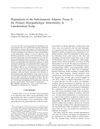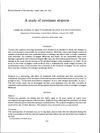 19 citations,
October 2017 in “European Journal of Pharmaceutics and Biopharmaceutics”
19 citations,
October 2017 in “European Journal of Pharmaceutics and Biopharmaceutics” The gel made of minoxidil and hydroxypropyl-β-cyclodextrin improves hair growth and is good for long-term use.
September 2022 in “Asian Journal of Surgery”  26 citations,
March 2015 in “Phytotherapy Research”
26 citations,
March 2015 in “Phytotherapy Research” Forsythiaside-A, a natural substance, can protect against hair loss and is more effective than current treatments, potentially making it a good option for hair loss treatment.
 32 citations,
June 2003 in “The American Journal of Dermatopathology”
32 citations,
June 2003 in “The American Journal of Dermatopathology” Lipedematous scalp is mainly caused by an increase in fat tissue under the skin and is different from lipedematous alopecia.
July 2021 in “Journal of reports in pharmaceutical sciences” The 2% minoxidil nanosuspension is as effective as the commercial product but safer and easier to use.
 7 citations,
July 2018 in “International Journal of Applied Pharmaceutics”
7 citations,
July 2018 in “International Journal of Applied Pharmaceutics” Chitosan nanoparticles are promising for sustained caffeine delivery through the skin.
 September 2023 in “International Journal of Applied Pharmaceutics”
September 2023 in “International Journal of Applied Pharmaceutics” The formulated gel is a promising treatment for alopecia areata.

Monthly PRP therapy is more effective than daily minoxidil for alopecia areata.
1 citations,
March 2022 in “IntechOpen eBooks” Aging reduces skin stem cell function, leading to changes like hair loss and slower wound healing.
 70 citations,
March 2008 in “Mechanisms of Ageing and Development”
70 citations,
March 2008 in “Mechanisms of Ageing and Development” Maintaining DNA health in stem cells is key to preventing aging and tissue breakdown.
 October 2012 in “Medical Hypotheses”
October 2012 in “Medical Hypotheses” Artemis dysfunction might cause hair loss through telomere shortening.
 10 citations,
April 2018 in “Facial Plastic Surgery”
10 citations,
April 2018 in “Facial Plastic Surgery” The surgical technique of scalp advancement and pretrichial brow lift shortens the forehead and lifts brows, is good for women and transgender women with high foreheads, but not recommended for men and has some risks.
 20 citations,
January 2015 in “Current problems in dermatology”
20 citations,
January 2015 in “Current problems in dermatology” Hair gets thinner, grayer, and changes texture with age due to genetics, environment, and cellular changes, affecting the growth cycle.
15 citations,
July 1993 in “The journal of investigative dermatology/Journal of investigative dermatology” Retinoids can change the hair growth cycle by extending the growth phase and shortening the rest phase.
 August 2016 in “Journal of Investigative Dermatology”
August 2016 in “Journal of Investigative Dermatology” Different levels of microRNAs in different parts of the scalp can cause male pattern baldness.

Certain drugs can worsen hair loss in people prone to androgenetic alopecia.
 January 2003 in “Springer eBooks”
January 2003 in “Springer eBooks” Androgenic alopecia is a type of hair loss that's partly inherited and can be due to hormonal imbalance.
 34 citations,
June 1990 in “British Journal of Dermatology”
34 citations,
June 1990 in “British Journal of Dermatology” Etretinate treatment changed hair growth patterns in many patients.
 2 citations,
December 2011 in “Annales de Dermatologie et de Vénéréologie”
2 citations,
December 2011 in “Annales de Dermatologie et de Vénéréologie” 2011 dermatological research found new skin aging markers, hair loss causes, skin defense mechanisms, and potential for new treatments.
 2 citations,
August 2022 in “Clinical Case Reports”
2 citations,
August 2022 in “Clinical Case Reports” A 17-year-old girl had severe, on-and-off hair loss, likely due to COVID-19. She was treated with Vitamin D3, biotin, and other supplements, and saw some improvement within a month.
 October 2022 in “Facial Plastic Surgery Clinics of North America”
October 2022 in “Facial Plastic Surgery Clinics of North America” Hair restoration surgery, including hairline-lowering and hair transplantation, can effectively treat hair loss and improve appearance in all ethnic groups.
August 2021 in “Journal of The American Academy of Dermatology” Newer contraceptives with less androgenic progestins may reduce female hair loss.
 October 2021 in “Journal of Investigative Dermatology”
October 2021 in “Journal of Investigative Dermatology” Edelweiss extract may help prevent hair loss and increase hair density.
 8 citations,
September 2010 in “Journal of Men's Health”
8 citations,
September 2010 in “Journal of Men's Health” Androgenic Alopecia, a common hair loss condition, can be effectively treated with finasteride and other treatments.

Minoxidil and finasteride are the only FDA-approved treatments for hair loss caused by genetic and hormonal factors, but their effectiveness is often doubted, indicating a need for new treatments.

The combination of ADSC secretome and minoxidil was most effective for hair growth in people with hair loss.
 53 citations,
May 1990 in “Journal of Dermatology”
53 citations,
May 1990 in “Journal of Dermatology” Minoxidil speeds up hair growth in rats without prolonging growth phase.
 10 citations,
April 2023 in “Acta biomaterialia”
10 citations,
April 2023 in “Acta biomaterialia” New hydrogel dressing with antibiotic speeds up burn healing and skin regeneration.
 5 citations,
February 2013 in “Dermatology and therapy”
5 citations,
February 2013 in “Dermatology and therapy” Crescina® lotion helps reduce hair loss and increase hair growth in males with androgenetic alopecia.
 68 citations,
December 1991 in “Annals of the New York Academy of Sciences”
68 citations,
December 1991 in “Annals of the New York Academy of Sciences” Hair growth can be induced by certain cells found at the base of hair follicles, and these cells may also influence hair development and regeneration.
























